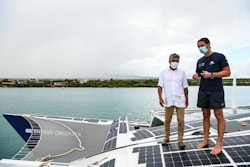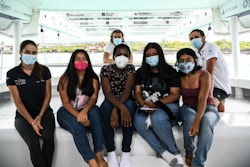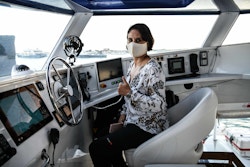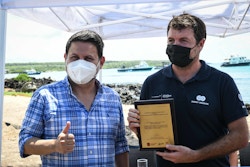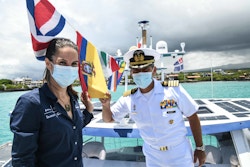Galápagos, Ecuador
¡Holà Galápagos! Our vessel arrived in the Galapagos, first stop in the Pacific at Puerto Ayora, on Santa Cruz island. On the program: meet scientists and engineers to better understand the energy challenges of these islands, and their work to protect a unique biodiversity in the world.
Coming from: Panama Canal, Panama
Weather conditions: Cloudy
Time of arrival: 5:00 PM
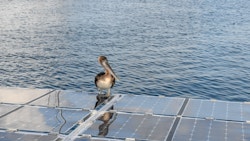
Arrival to the Galapagos Islands
His Majesty Neptune

🧜♂️ Have you ever heard of the "line-crossing ceremony"?
In this ritual, it is the custom for #sailors crossing the #equator for the first time to introduce themselves to Neptune, god of seas and oceans! The novices ask for His protection while sailing through this area feared for rough, which seperates the North from the South hemisphere. Our crew (and our captain!) had their heart set on respecting the tradition when they passed through the equator for the first time of their lives with the ship!
🌊☀️🌬 May Neptune provide them with wind, sun, currents and hydrogen!
A Unesco Biosphere Reserve
The Galapagos Islands are known to be home to a unique ecosystem that greatly inspired Charles Darwin and his theory of evolution. Sanitary measures upon arrival in port are draconian to protect the numerous endemic species of the archipelago. Our crew had to redouble their efforts to obtain permission to drop anchor.
Unesco has partnered with Energy Observer since 2016 with the common goal of promoting and raising awareness of sustainable energy and collaborating on ocean protection and biodiversity. The partnership integrates the activities of the Intergovernmental Oceanographic Commission in ocean sciences and the Man and the Biosphere (MAB) Program in biodiversity, which celebrates its 50th anniversary in 2021.
“Energy Observer, by sailing in perfect harmony with nature, helps us to imagine and contribute to the sustainable and prosperous development of our common home: the planet Earth. In this, it perfectly embodies UNESCO's motto "changing minds, not the climate".”
A zero impact Noah's Ark
Our captain woke up at anchor with new crew members: four Galapagos sea lions, and a pelican! Animals that did not seem to be bothered either by the presence of the boat or the human beings on board.
Other visitors visited us during the first days, but of a different kind!
Local institutions, politicians, representatives and associations are very interested in the on-board technologies of our ship to develop on land zero-emission mobility solutions, as well as energy systems that would no longer rely on fossil fuels.
